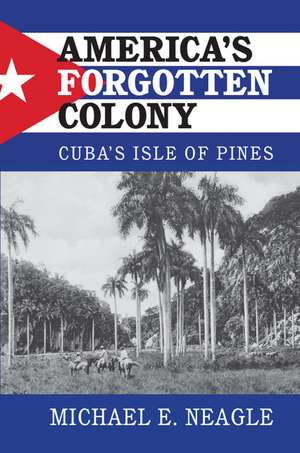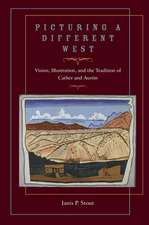America's Forgotten Colony: Cuba's Isle of Pines: Cambridge Studies in US Foreign Relations
Autor Michael E. Neagleen Limba Engleză Paperback – 23 dec 2016
| Toate formatele și edițiile | Preț | Express |
|---|---|---|
| Paperback (1) | 226.35 lei 3-5 săpt. | |
| Cambridge University Press – 23 dec 2016 | 226.35 lei 3-5 săpt. | |
| Hardback (1) | 688.33 lei 3-5 săpt. | |
| Cambridge University Press – 23 dec 2016 | 688.33 lei 3-5 săpt. |
Din seria Cambridge Studies in US Foreign Relations
- 11%
 Preț: 694.04 lei
Preț: 694.04 lei -
 Preț: 208.30 lei
Preț: 208.30 lei -
 Preț: 289.78 lei
Preț: 289.78 lei -
 Preț: 289.87 lei
Preț: 289.87 lei -
 Preț: 230.51 lei
Preț: 230.51 lei -
 Preț: 189.86 lei
Preț: 189.86 lei -
 Preț: 179.34 lei
Preț: 179.34 lei -
 Preț: 287.07 lei
Preț: 287.07 lei -
 Preț: 236.02 lei
Preț: 236.02 lei -
 Preț: 271.77 lei
Preț: 271.77 lei - 11%
 Preț: 536.64 lei
Preț: 536.64 lei -
 Preț: 325.16 lei
Preț: 325.16 lei -
 Preț: 227.49 lei
Preț: 227.49 lei -
 Preț: 289.95 lei
Preț: 289.95 lei -
 Preț: 226.17 lei
Preț: 226.17 lei -
 Preț: 181.93 lei
Preț: 181.93 lei -
 Preț: 321.90 lei
Preț: 321.90 lei -
 Preț: 179.53 lei
Preț: 179.53 lei -
 Preț: 211.94 lei
Preț: 211.94 lei -
 Preț: 413.07 lei
Preț: 413.07 lei -
 Preț: 406.71 lei
Preț: 406.71 lei -
 Preț: 372.00 lei
Preț: 372.00 lei -
 Preț: 405.35 lei
Preț: 405.35 lei
Preț: 226.35 lei
Nou
Puncte Express: 340
Preț estimativ în valută:
43.31€ • 46.32$ • 36.11£
43.31€ • 46.32$ • 36.11£
Carte disponibilă
Livrare economică 28 martie-11 aprilie
Preluare comenzi: 021 569.72.76
Specificații
ISBN-13: 9781316502013
ISBN-10: 1316502015
Pagini: 318
Ilustrații: 17 b/w illus.
Dimensiuni: 153 x 228 x 19 mm
Greutate: 0.46 kg
Editura: Cambridge University Press
Colecția Cambridge University Press
Seria Cambridge Studies in US Foreign Relations
Locul publicării:New York, United States
ISBN-10: 1316502015
Pagini: 318
Ilustrații: 17 b/w illus.
Dimensiuni: 153 x 228 x 19 mm
Greutate: 0.46 kg
Editura: Cambridge University Press
Colecția Cambridge University Press
Seria Cambridge Studies in US Foreign Relations
Locul publicării:New York, United States
Cuprins
Introduction; Part I. The Hay-Quesada Era: 1. Promoting a new frontier; 2. Going south; 3. Squeezing a profit; 4. Creating community; 5. The sword of Damocles; Part II. Becoming Good Neighbors: 6. A time of struggle; 7. 'A happy society'; 8. Revolution and the last exodus; Conclusion.
Recenzii
'In unearthing the story of the doomed US settlement of Cuba's Isle of Pines, Michael E. Neagle weaves a tale at once complex, sad and always fascinating, a veritable saga of US hegemonic ups and downs in the Caribbean. Displaying elegant writing, remarkable research and careful judgment, America's Forgotten Colony ensures that it will never again be.' Alan McPherson, University of Oklahoma
'Michael E. Neagle has written a superb social history of American Empire in Cuba focusing on the longstanding US attempt to colonize and annex the Isle of the Pines off the southwest coast of Cuba in the early 1900s. His meticulously researched and beautifully written work relies upon a broad range of US, Cuban and Caribbean sources. America's Forgotten Colony makes an important contribution to the growing field of US imperialism studies and earns high marks for its fascinating historical analysis.' Michael E. Donoghue, Marquette University, Wisconsin
'What an impressive study - handsomely written, extensively researched, and interpretatively challenging. Neagle tells the fascinating human story of US settlers on the Isle of Pines as they interacted with native Cubans, strove to make new lives and profits from farms and tourism, lobbied for US annexation, and ultimately failed. In this microcosmic work, Neagle effectively places the sixty year US presence on the Isle in the context of the overarching themes of US expansion and empire, territorial, commercial, and cultural. He discovered a non-violent colonialism by land investors, fruit growers, retirees, and teachers, not by US diplomats or soldiers.' Thomas G. Paterson, author of Contesting Castro: The United States and the Triumph of the Cuban Revolution.
'The revelatory power of the Cuban past is often found within the small histories, those sites that allow the historian to interrogate in close quarters the workings of large systems as a condition of daily life. Neagle's model study of the Isle of Pines is one such history. It offers a probing exploration of US hegemony, rich with insight into the ways that power was exercised and experienced. A very much welcomed addition to the scholarship on US - Cuba relations.' Louis A. Pérez, Jr, University of North Carolina, Chapel Hill
'Neagle (Nichols College) explores the history of US imperialism through the lens of a US settlement on Cuba's Isle of Pines, using this case study to challenge the conventional narrative that direct colonization by the US ended at the dawn of the 20th century. … Neagle elucidates how US settlers sought to consolidate US hegemony through outright annexation, commercial ties, and cultural influence. However, he also suggests that they came in search of better opportunities, evincing middle-class Americans' discontent with life in the US. US influence on the isle declined after 1925 and nearly disappeared after the 1959 revolution. … by reconstructing this failed attempt at colonization, Neagle creatively reimagines traditional diplomatic history by focusing on non-state actors to draw out the cultural dimensions of US imperialism. Summing Up: Recommended. All academic levels/libraries.' CHOICE
'Neagle offers a seamless narrative illuminating a unique chapter in the history of American colonialism.' The Journal of American History
'Michael E. Neagle has written a superb social history of American Empire in Cuba focusing on the longstanding US attempt to colonize and annex the Isle of the Pines off the southwest coast of Cuba in the early 1900s. His meticulously researched and beautifully written work relies upon a broad range of US, Cuban and Caribbean sources. America's Forgotten Colony makes an important contribution to the growing field of US imperialism studies and earns high marks for its fascinating historical analysis.' Michael E. Donoghue, Marquette University, Wisconsin
'What an impressive study - handsomely written, extensively researched, and interpretatively challenging. Neagle tells the fascinating human story of US settlers on the Isle of Pines as they interacted with native Cubans, strove to make new lives and profits from farms and tourism, lobbied for US annexation, and ultimately failed. In this microcosmic work, Neagle effectively places the sixty year US presence on the Isle in the context of the overarching themes of US expansion and empire, territorial, commercial, and cultural. He discovered a non-violent colonialism by land investors, fruit growers, retirees, and teachers, not by US diplomats or soldiers.' Thomas G. Paterson, author of Contesting Castro: The United States and the Triumph of the Cuban Revolution.
'The revelatory power of the Cuban past is often found within the small histories, those sites that allow the historian to interrogate in close quarters the workings of large systems as a condition of daily life. Neagle's model study of the Isle of Pines is one such history. It offers a probing exploration of US hegemony, rich with insight into the ways that power was exercised and experienced. A very much welcomed addition to the scholarship on US - Cuba relations.' Louis A. Pérez, Jr, University of North Carolina, Chapel Hill
'Neagle (Nichols College) explores the history of US imperialism through the lens of a US settlement on Cuba's Isle of Pines, using this case study to challenge the conventional narrative that direct colonization by the US ended at the dawn of the 20th century. … Neagle elucidates how US settlers sought to consolidate US hegemony through outright annexation, commercial ties, and cultural influence. However, he also suggests that they came in search of better opportunities, evincing middle-class Americans' discontent with life in the US. US influence on the isle declined after 1925 and nearly disappeared after the 1959 revolution. … by reconstructing this failed attempt at colonization, Neagle creatively reimagines traditional diplomatic history by focusing on non-state actors to draw out the cultural dimensions of US imperialism. Summing Up: Recommended. All academic levels/libraries.' CHOICE
'Neagle offers a seamless narrative illuminating a unique chapter in the history of American colonialism.' The Journal of American History
Notă biografică
Descriere
Analysis of the American presence on the Isle of Pines illustrates how US influence adapted and endured in republican-era Cuba.














